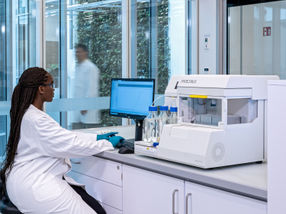Octet SF3
Surface Plasmon Resonance (SPR) using Single Dynamic Injections for Kinetics and Affinities
Sartorius AG

One of the most common applications of surface plasmon resonance (SPR) is identification and characterisation of new drugs in the pharmaceutical industry. The Octet SF3 SPR instrument brings you in "OneStep" to the accurate characterisation of protein-protein interactions and the binding of low molecular weight compounds to protein structures.
Unlike the traditional approach of multi-cycle kinetics based on a dilution series in a matched concentration range, with the patented OneStep single gradient injection, the binding curve is generated from the change in reaction over time simultaneously with the change in concentration over time. This leads to much more information and allows the calculation of the complete binding kinetics with only one concentration, which always falls within the measurable concentration range due to the dilution process. Imagine getting target structures, binding kinetics and aggregation data from your primary screen with a single injection.
Increase the efficiency and quality of fragment-based drug screenings with OneStep.
Request information about Octet SF3 now

Octet SF3
Surface Plasmon Resonance (SPR) using Single Dynamic Injections for Kinetics and Affinities
Product classification Octet SF3
Find more %topic% and related products
Find Octet SF3 and related products in the theme worlds
Topic world Protein analytics
Protein analytics provides a deep insight into these complex macromolecules, their structure, function and interactions. It is essential for discovering and developing biopharmaceuticals, understanding disease mechanisms, and identifying therapeutic targets. Techniques such as mass spectrometry, Western blot and immunoassays allow researchers to characterize proteins at the molecular level, determine their concentration and identify possible modifications.

Topic world Protein analytics
Protein analytics provides a deep insight into these complex macromolecules, their structure, function and interactions. It is essential for discovering and developing biopharmaceuticals, understanding disease mechanisms, and identifying therapeutic targets. Techniques such as mass spectrometry, Western blot and immunoassays allow researchers to characterize proteins at the molecular level, determine their concentration and identify possible modifications.

